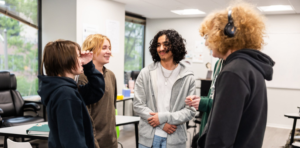How to stop over-parenting and let your kids tough it out
Instead of being a snowplow parent, give your kid a shovel and show them how to use it.
Helicopter parent, snowplow, lawn mower, bull dozing, blackhawk, tiger mom…there are an increasing number of phrases used to describe today’s parents in a pretty unflattering light. We hear that seemingly well-meaning parents are actually doing harm to their kids, all under the guise of parenting. The latest high profile case was parents bribing SAT/ACT proctors, fabricating their children’s transcripts, and paying off college coaches to get their children into “elite” colleges.
Let’s be honest, we all can identify with at least some of these traits. How many of us have called up our children’s school to request a certain teacher, made a point of ingratiating ourselves to our child’s coach in the hopes of getting th em more playing time, volunteered to be a room parent in order to get the inside scoop on class and the teacher’s ear, or signed up to coordinate the snack table at the school play, in hopes that our parent dedication will translate to a better part for our child?
em more playing time, volunteered to be a room parent in order to get the inside scoop on class and the teacher’s ear, or signed up to coordinate the snack table at the school play, in hopes that our parent dedication will translate to a better part for our child?
Growing up, my daughter was very into singing, acting, and musical theatre. For a long time, she often got callbacks, but never got a leading role. There were countless times when it was between her and another child and the other child always got the part. I felt for my daughter, cried for her and felt her pain. I remember being angered by the perceived injustice. I debated calling the theatre director and giving her a piece of my mind…but I didn’t. Instead, I stepped back and thought: if my daughter wanted to be in the theatre world, she needed to develop a tougher skin.
The good news is that she did overcome these challenges, all on her own, and went on to bigger roles and even directing in college. She did this all that on her own. I didn’t help her at all, and I couldn’t be prouder. And, she’s more proud that she did it herself.
A recent New York Times article, How Parents are Robbing Their Children of Adulthood by Claire Cain Miller and Jonah Engel Bromwich (March 16, 2019), talks about how many parents’ well meaning attempts to help their children actually ends up handicapping them.
- The helicopter parent is accused of being overprotective and hovering over their children out of fear. They’re fearful of their child getting hurt, feeling pain, or making a mistake.
- The snowplow parent takes it a step further and is clearing obstacles out of the way, so that their child has an unobstructed path to success. This may mean stacking the deck, to make sure their child gets into the right school, team or program. The problem is, that child is missing out on enjoying their own success after a struggle, when they aren’t allowed to do it for themselves.
The pitfalls of over-parenting
If we don’t give our child responsibility, they feel like nothing is ever their fault. They don’t understand cause and effect. If we don’t let our child make a mistake, they don’t know how to bounce back from failure. If we don’t let our child feel sadness, when they finally do, they have no coping skills to help them move past that sadness.
Experiencing disappointment, loss and failure ultimately builds up our children. They learn how to work through struggles, to problem-solve, and persevere. When we do things FOR our kids, what we’re unintentionally saying to them is that we don’t think they can do it themselves. We don’t trust them. We don’t think they have what it takes – the skills, the stick-to-it-ness. And they won’t, if we don’t let them.
While the short-term effects of over-parenting can show themselves throughout childhood, the long-term effects become painfully clear when kids leave for college or the workforce. Some kids get overwhelmed, because they now have to make decisions and choices and face the impact of those decisions; the responsibility can become daunting. Others relish the freedom, but start acting out, because there is no one there to control them or tell them no. However, since they haven’t learned that actions have consequences, they end up finding it out in very painful ways.
Cultivating Resilience
Think about it: when our child was crawling and started to walk, they fell down…a lot. We need to let them fall down throughout their development, a lot, as children and adolescents, so that they can practice how to get back up, brush themselves off and move forward on the path to becoming adults.
We’re inundated with advice and criticism on how to parent. So, as parents, what SHOULD we be doing?
DON’T: Do the work for your kids
DO: Let your kids make mistakes and even fail; that’s how children learn and grow
DON’T: shield your child from feeling negative emotions like pain, sadness, and disappointment
DO: Let your child experience and work through negative emotions
DON’T: Give children whatever they want
DO: Set boundaries and limits; children feel safe when they know the rules; be consistent and don’t be afraid to say no.
DON’T: Fix everything for them
DO: Let your child face challenges and even struggle; they’ll learn how to problem-solve
DON’T: Fight their battles (friends, teachers, employers)
DO: Let your child feel what responsibility is (it might mean that they get a bad grade, get fired, or sit on the bench; better they experience that for the first time as a child than as an adult; then, they can learn how to handle it.)
DON’T: Tie your happiness to theirs; we often feel embarrassed if our child performs poorly, thinking it’s a negative reflection on ourselves
DO: Make sure you have your own life; Model the kind of life and values you want your children to have.
DON’T: Push your kids to accelerate (academics, sports, arts)
DO: Let your child make choices; give your child permission to choose what’s best for them
Baby Steps
I know this all sounds like a tall order, so start small. Vow NOT to bring your child their forgotten lunch or homework, don’t write them an excuse they don’t deserve, don’t praise them when they don’t deserve praise or make them their own dinner (they can eat what everyone else is eating).
Do – listen and be present for them. Do – model the types of behaviors and attributes you want your children to cultivate; children pay more attention to what you DO versus what you say. Think out loud. Show your child how you problem-solve. Prepare your kids to handle risks. Empower children to discover who they are – allow them to be themselves.
Be a good-enough parent. That is enough. Perfection is not possible, so just do your best…and get some sleep!
Posted in:

